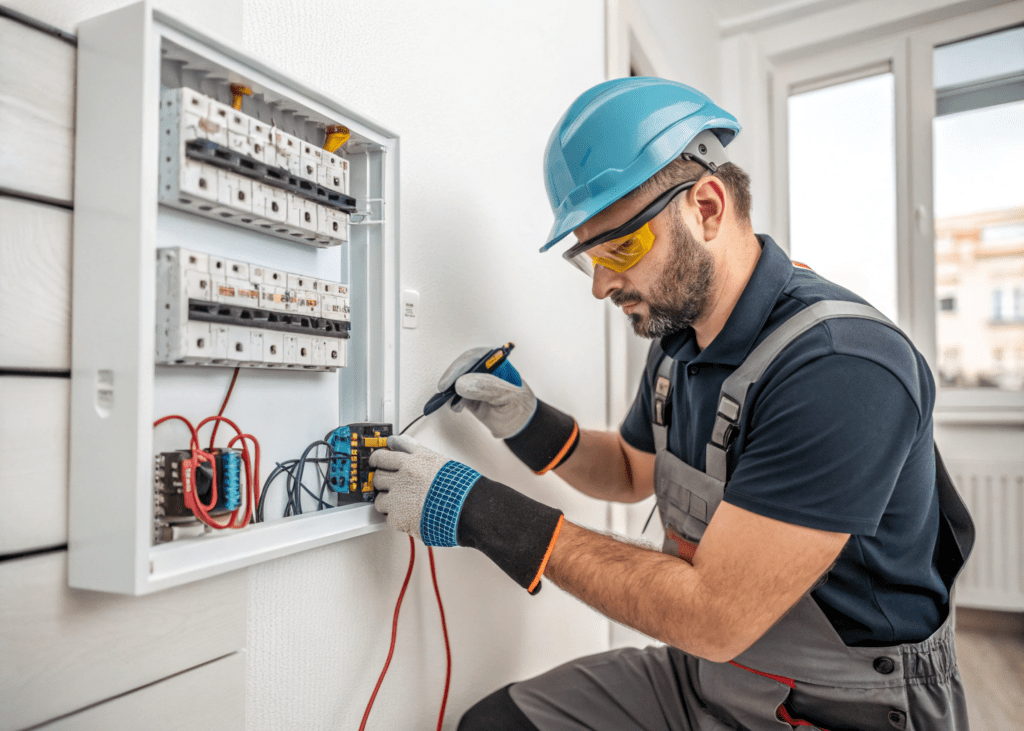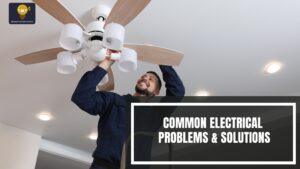Expert Electrical Installation and Installing Circuit Breaker for a Safe Home
Your home’s electrical system is vital for keeping daily life running without interruptions. Proper electrical installation ensures that power flows safely and efficiently throughout your house. Installing circuit breakers correctly is equally important, as they protect your home from electrical overloads and potential hazards. Whether you’re constructing a new home, renovating an existing one, or upgrading your electrical panel, professional electrical work is essential. Skilled electricians follow safety standards and local codes to prevent risks like fires or shocks. Investing in expert electrical installation and circuit breaker services keeps your home safe, reliable, and prepared for your power needs.
What Is Electrical Installation and Why Is It Important?
Electrical installation refers to the process of setting up the electrical wiring, outlets, switches, panels, and other components that deliver power safely throughout your home. This process must follow strict safety codes and standards to protect your home and family from electrical fires, shocks, or damage.
When done correctly, electrical installation guarantees a steady and safe flow of electricity. It supports everything from lighting and appliances to heating and cooling systems. Poor or faulty installation can lead to dangerous situations such as short circuits, overloaded wiring, and frequent breaker trips.
The Basics of the Installation of Circuit Breakers
A circuit breaker is a critical safety device in your electrical panel that automatically stops the flow of electricity in case of overload or short circuits. Adding circuit breakers correctly ensures that electrical faults do not cause fires or damage your electrical system. When installing circuit breakers, it’s important to select the right size and type for each circuit to handle the expected electrical load safely. Improper installation can cause breakers to trip unnecessarily or fail to protect your home during an electrical fault. Only licensed electricians should handle the installation of circuit breaks to guarantee safety and compliance with local codes.
Why You Should Hire Professionals for Your Electric Installations
While some homeowners consider DIY electrical work, it’s best to leave electric installation to professionals. Mistakes during wiring or breaker installation can cause costly damage and serious safety hazards. Professional electricians have the training, experience, and tools to complete electrical installations safely and efficiently. They understand local electrical codes and standards, ensuring your system is compliant. Additionally, they can recommend upgrades and solutions tailored to your home’s specific needs. Hiring a professional also means you get proper inspections and permits, which are often required by law to ensure the work meets safety requirements.
Signs You Need Electric Installation or Circuit Breaker Upgrades
Certain warning signs indicate that your home might require electric installation upgrades or installing new circuit breakers:
- Frequent tripping of breakers during normal appliance use.
- Flickering or dimming lights when using multiple devices.
- Outlets or switches that feel warm or emit a burning smell.
- Visible damage or wear on wiring, outlets, or your electrical panel.
- Your electrical panel is outdated or too small for your current power needs.
- Planning to add new appliances or remodeling your home.
- Lack of GFCI breakers in wet areas like kitchens and bathrooms.
If you notice any of these signs, scheduling an electrical inspection and possible upgrades is crucial.
Steps Involved in Electric Installation
Electric installation is a detailed process that includes:
- Planning: The electrician assesses your home’s power needs and develops a wiring plan.
- Installing Wiring: Running electrical wires through walls, ceilings, and floors to connect outlets, switches, and fixtures.
- Setting up circuit breaks: Placing the correct breakers in your electrical panel and connecting circuits.
- Connecting Fixtures and Devices: Hooking up lighting, outlets, appliances, and other electrical components.
- Testing: Verifying that all circuits work correctly and safely.
- Inspection: Passing a safety inspection to meet local code requirements.
Each step must be done carefully to ensure the entire system is safe and reliable.
The Importance of Correct Circuit Breaker Installation
Circuit breakers protect your home by stopping electrical flow during overloads or short circuits. Correct circuit breaker installation includes choosing the right breaker size, properly wiring it to the panel, and securely mounting it. If breakers are too large for a circuit, they won’t trip when needed, risking fire or damage. If they are too small, they may trip unnecessarily, causing power interruptions. Correct installation ensures your electrical system responds appropriately to faults.
Common Types of Circuit Breakers Used in Homes
Understanding the types of circuit breakers helps homeowners know what they need:
- Standard Circuit Breakers: Protect against overloads and short circuits.
- Ground Fault Circuit Interrupters (GFCI): Required in kitchens, bathrooms, and outdoor outlets to prevent electric shocks.
- Arc Fault Circuit Interrupters (AFCI): Detect electrical arcs that can cause fires.
- Double-Pole Breakers: Used for large appliances like ovens or HVAC systems, handling 240 volts.
A professional electrician will recommend the right types for each circuit in your home.
Safety Tips for Homeowners Regarding Installation of Electrical Systems
While professionals handle most electrical work, you can keep your home safer by:
- Avoid overloading outlets with too many devices.
- Not using damaged cords or plugs.
- Keeping outlets away from water sources unless they are GFCI-protected.
- Report any flickering lights, buzzing sounds, or burning smells to an electrician immediately.
- Not attempting to install or replace circuit breakers yourself.
- Scheduling regular electrical inspections.
Following these tips helps prevent accidents and electrical failures.
The Benefits of Professional Installation of Electrical Systems
Professional installation of electricity offers many advantages:
- Safety: Correct installation reduces fire risk and protects your family.
- Reliability: Proper wiring and breakers prevent outages and electrical damage.
- Compliance: Work meets local building and safety codes.
- Longevity: Well-installed systems last longer and require fewer repairs.
- Energy Efficiency: Modern wiring and devices can reduce electricity use.
- Insurance Coverage: Professional work ensures your insurance remains valid.
Investing in professional installation protects your home and peace of mind.
When to Upgrade Your Circuit Breaker Panel
Electrical panel upgrades, including installing new circuit breakers, are often needed when:
- Your home has an older panel with limited circuits.
- You add major appliances or renovate your home.
- Breakers trip frequently or fail to reset.
- Your panel shows signs of damage, rust, or overheating.
- Your home’s electrical load exceeds your current panel’s capacity.
Upgrading your panel improves safety and prepares your home for modern energy demands.
How to Find the Right Electrician for Your Electrical Work
To find a trustworthy electrician for your electrical setup and circuit breaker work:
- Verify their license and insurance.
- Ask about experience with residential electrical installation.
- Check reviews and ask for references.
- Request clear, written estimates.
- Confirm they follow safety standards.
- Choose electricians who provide guarantees or warranties.
- Ensure they offer post-installation support and inspections.
A qualified electrician will guide you through the process and complete the job safely and on time.
Conclusion
Proper electrical installation and installing circuit breakers correctly are essential to keeping your home safe and powered. These tasks prevent electrical hazards and improve the system. reliability, and ensure your home meets current safety standards. Hiring a professional electrician guarantees the job is done right, protecting your family and property. Don’t wait for warning signs or emergencies schedule electrical work or circuit breaker upgrades today for a safer, more reliable home.




